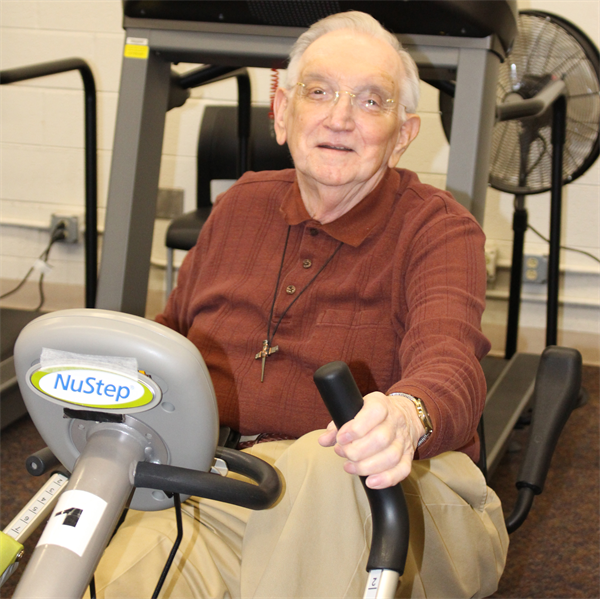
Cas Wesolek is grateful to be working out three times a week at the Cardiac-Pulmonary Rehabilitation Center at McLaren Greater Lansing, though it is quitea change in scenery from his previous walks at the Lansing Mall.
The 83-year old Wesolek used to enjoy taking a 20-minute, mile-long walk around the interior of the mall five days a week. But that routine came to a halt in June of last year when the Lansing resident experienced shortness of breath one day and within a week could not walk more than a tenth of a mile without becoming winded. A subsequent heart catheterization performed by a McLaren Greater Lansing team led by Dr. Peter Burke revealed Wesolek had an estimated 85 percent blockage in three of his arteries. Four days later, he underwent triple-bypass surgery performed by a team led by Dr. Divyakant Gandhi.
“I knew something was wrong,” Wesolek said about his shortness of breath. “But the last thing I expected was it would be my heart because I had passed a stress test not too long before that.”
Wesolek was “very concerned” when he, his wife Odetta, and their daughter, Kathy Risch, came to the Cardiac Catheterization Laboratory for his procedure. But he said the staff was “very relaxed and calm” and that helped put him in a similar frame of mind.
“They weren’t panicky and moving me around quickly, like they wanted to get me in and out of there,” he said. “They made me feel like I was a very important person and they wanted me to feel comfortable.”
Members of the Cath Lab team that cared for Wesolek contributed to his positive experience by talking with him while keeping him consciously sedated during the procedure. Kim Hiltunen, patient care manager of the Cardiac Cath Lab, said Wesolek also benefitted from the “unconscious competency” of those team members. That quality comes from the knowledge and experience they have accumulated through the years, and enables them to carry on detailed conversations with patients while performing complicated tasks.
Hiltunen said his staff is very good at engaging with their patients while helping them relax during a heart catheterization or other transvascular procedures. Patients have frequently said they were “scared, even petrified, when they came in here, but the staff do a wonderful job of calming them down.”
Hiltunen said that has especially been the experience of patients who arrived suffering a heart attack and left the department thankful for the rescue work performed by physicians and the Cath Lab team.
While Hiltunen takes pride in the positive feedback from patients, he is also proud of the extensive upgrades to the Cardiac Cath Lab since June of 2016 that have paid dividends for patients in many ways, including the reduction of radiation and contrast exposure while undergoing life- and limb-saving procedures. The results are higher-quality images for physicians and improved outcomes for patients.
Wesolek’s experience last year was related to coronary artery blockages. But other patients have cardiac issues of a different nature, particularly heart rhythm disorders. Many patients with atrial fibrillation (AFib), often described as a quivery, fluttery heartbeat, have benefitted greatly from the Cath Lab’s state-of-the-art technology, specifically catheter ablations that have helped their hearts regain normal rhythm and function.
Led by Dr. Khalil Kanjwal, the electrophysiology team conducted more than 130 catheter ablations in the past year, with at least 100 being for AFib patients. And in August, the team completed its first ablation for an AFib patient without using fluoroscopy, thus further sparing patients’ exposure to unnecessary radiation.
“Dr. Kanjwal has so much knowledge and experience and that is allowing the team to conduct some extremely high-tech procedures,” said Dr. Ibrahim Shah, medical director of the Cardiac Cath Lab. “It’s very impressive what they have been able to do.”
Wesolek is thankful for the care he received in the Cardiac Cath Lab. Three days a week, he takes part in an hour-long workout routine at the hospital’s Cardiac-Pulmonary Rehabilitation Center using equipment (NuStep machine, arm bike, treadmill) supported by grants from the McLaren Greater Lansing Foundation.
“I always feel more energetic and ambitious after I’m done,” he said. “I felt that way after walking in the mall and I feel that way after working out in the rehab center.”
To learn more about the Cardiac Cath Lab at McLaren Greater Lansing, please call 517.975.6125.
If you would like to support the Cardiac Cath Lab, or another unit, program or department at the hospital, please call the McLaren Greater Lansing Foundation at 517.975.7100, email [email protected], or visit www.mclaren.org/lansingfoundation.